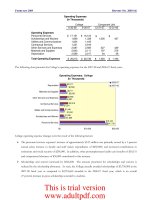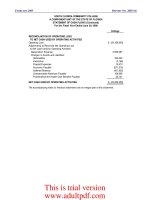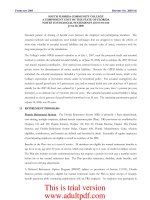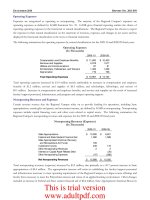REPORT NO. 2011-106 FEBRUARY 2011 FLORIDA GULF COAST UNIVERSITY Financial Audit_part3 potx
Bạn đang xem bản rút gọn của tài liệu. Xem và tải ngay bản đầy đủ của tài liệu tại đây (161.03 KB, 11 trang )
FEBRUARY 2011 REPORT NO. 2011-106
FLORIDA GULF COAST UNIVERSITY
A COMPONENT UNIT OF THE STATE OF FLORIDA
NOTES TO FINANCIAL STATEMENTS (C
ONTINUED)
J
UNE 30, 2010
19
pool. Disclosures for the State Treasury investment pool are included in the notes to financial statements of
the State’s Comprehensive Annual Financial Report.
Cash and Cash Equivalent – Component Unit
. Cash and cash equivalents of the Foundation (discretely
presented component unit) consist of bank deposits of which $490,659 is insured by the Federal deposit
insurance with the remainder of $3,540,505 collateralized under the Florida Public Deposits Program.
The amount reported as unrestricted cash and cash equivalents for the Foundation at June 30, 2010, includes
at fair value $5,040,115 of Foundation moneys held in the State Treasury SPIA investment pool representing
ownership of a share of the pool, not the underlying securities. The SPIA carried a credit rating of Af by
Standard & Poor’s and had an effective duration of 1.81 years at June 30, 2010. The Foundation relies on
policies developed by the State Treasury for managing interest rate risk or credit risk for this investment
pool. Disclosures for the State Treasury investment pool are included in the notes to financial statements of
the State’s Comprehensive Annual Financial Report.
Capital Assets
. University capital assets consist of land, construction in progress, buildings, infrastructure
and other improvements, furniture and equipment, property under capital leases, library resources, works of
art and historical treasures, and other capital assets. These assets are capitalized and recorded at cost at the
date of acquisition or at estimated fair value at the date received in the case of gifts and purchases of State
surplus property. Additions, improvements, and other outlays that significantly extend the useful life of an
asset are capitalized. Other costs incurred for repairs and maintenance are expensed as incurred. The
University has a capitalization threshold of $1,000 for tangible personal property and $100,000 for buildings
and other improvements. Depreciation is computed on the straight-line basis over the following estimated
useful lives:
Buildings – 35 to 50 years
Infrastructure and Other Improvements – 10 to 50 years
Property Under Capital Lease – 8 to 10 years
Furniture and Equipment:
Equipment (Other than Moveable) – 10 to 25 years
Computer Equipment – 3 to 6 years
Moveable Equipment – 5 to 20 years
Library Resources – 10 years
Works of Art and Historical Treasures – 20 years
Other Capital Assets – 4 to 10 years
Noncurrent Liabilities
. Noncurrent liabilities include principal amounts of bonds payable, loan payable,
capital leases payable, compensated absences payable, and other postemployment benefits payable that are
not scheduled to be paid within the next fiscal year. Bonds payable are reported net of unamortized
This is trial version
www.adultpdf.com
FEBRUARY 2011 REPORT NO. 2011-106
FLORIDA GULF COAST UNIVERSITY
A COMPONENT UNIT OF THE STATE OF FLORIDA
NOTES TO FINANCIAL STATEMENTS (C
ONTINUED)
J
UNE 30, 2010
20
premium or discount. The University amortizes bond premiums and discounts over the life of the bonds
using the straight-line method.
2. PRIOR PERIOD ADJUSTMENT
The University’s beginning net assets was increased by $6,449,391 as a result of a change in the reporting of
bonds payable for State University System Capital Improvement Trust Fund Revenue Bonds. In prior fiscal
years the liability for these bonds was reported on the University’s statement of net assets. It has
subsequently been determined that these bonds are not debt of the University. Although proceeds from the
bonds were provided to the University for capital projects, the University is not responsible for the
repayment of the bonds. Repayment of the bonds is the responsibility of the Florida Board of Governors to
be paid from capital improvement fees collected by all universities and remitted in total to the Florida
Department of Education.
3. INVESTMENTS
Section 1011.42(5), Florida Statutes, authorizes universities to invest funds with the State Treasury and State
Board of Administration, and requires that universities comply with the statutory requirements governing
investment of public funds by local governments. Accordingly, universities are subject to the requirements
of Chapter 218, Part IV, Florida Statutes. The University’s Board of Trustees has not adopted a written
investment policy. As such, pursuant to Section 218.415(17), Florida Statutes, the University is authorized to
invest in the Local Government Surplus Funds Trust Fund investment pool administered by the State Board
of Administration; interest-bearing time deposits and savings accounts in qualified public depositories, as
defined in Section 280.02, Florida Statutes; direct obligations of the United States Treasury; and Securities
and Exchange Commission registered money market funds with the highest credit quality rating from a
nationally recognized rating agency. Of the reported investments, $1 million is restricted by the covenants
of the bond reimbursement agreement for the Capital Improvement Revenue Bonds, Series 2008A.
Investments set aside to make debt service payments, maintain sinking or reserve funds, or to purchase or
construct capital assets are classified as restricted.
External Investment Pools
The University reported investments at fair value totaling $53,605,579 at June 30, 2010, in the State Treasury
Special Purpose Investment Account (SPIA) investment pool, representing ownership of a share of the pool,
not the underlying securities. The SPIA carried a credit rating of Af by Standard and Poor’s and had an
effective duration of 1.81 years at June 30, 2010. The University relies on policies developed by the State
Treasury for managing interest rate risk or credit risk for this investment pool. Disclosures for the State
Treasury investment pool are included in the notes to financial statements of the State’s Comprehensive
Annual Financial Report.
Component Unit Investments
Investments held by the University’s discretely presented component unit (Foundation) at June 30, 2010, are
reported at fair value, as follows:
This is trial version
www.adultpdf.com
FEBRUARY 2011 REPORT NO. 2011-106
FLORIDA GULF COAST UNIVERSITY
A COMPONENT UNIT OF THE STATE OF FLORIDA
NOTES TO FINANCIAL STATEMENTS (C
ONTINUED)
J
UNE 30, 2010
21
Investment Type Amount
U.S. Government and Federal
Agency Obligations 4,236,387$
Bonds, Notes and Other Debt Securities 4,601,059
Stocks and Other Equity Securities 5,207,845
Mutual Funds 28,834,330
Other Investments 2,346,867
Total Component Unit Investments 45,226,488$
The Foundation’s investment policy allows for investments in equity securities traded on the three principal
United States Stock Exchanges (NYSE, AMEX, and NASDAQ), and the Foundation only purchases
securities of companies with at least a market capitalization of $1 billion. For fixed income instruments, the
Foundation’s policy allows investments in bonds issued by the United States Government and an agency of
the United States Government, public traded corporations or their affiliates, taxable municipal bonds,
preferred stocks, and real estate investment trusts.
Interest Rate Risk: The Foundation’s investment policy does not limit debt obligation maturities. The
Foundation’s investments in debt securities at June 30, 2010, are reported at fair value as follows:
Investment Type Fair
Value Less than 1 - 5 5 - 10 Over 10
1 Year Years Years Years
U.S. Government and
Federal Agency Obligations 4,236,387$ 53,213$ 1,548,538$ 1,641,932$ 992,704$
Bonds, Notes, and Other
Debt Securities 4,601,059 233,180 2,036,517 1,471,360 860,002
Total 8,837,446$ 286,393$ 3,585,055$ 3,113,292$ 1,852,706$
Investment Maturities (In Years)
Credit Risk: As required by the Foundation’s investment policy, all corporate bond issues are rated BAA or
BBB or better by Moody’s or Standard & Poor’s rating services, respectively. The Foundation’s mutual
funds are not rated by a nationally recognized statistical rating organization.
Custodial Credit Risk: The Foundation utilizes the services of eight investment managers. All investments,
except for certificates of deposit and debt securities, are held by the investment managers and are uninsured
and unregistered, with securities held by the counter-party’s trust department or agent in the Foundation’s
name. The Foundation has $8,837,446 in debt securities, of which $3,130,567 is held by the investment
managers and is uninsured and unregistered, with securities held by the counter-party’s trust department or
agent in the Foundation’s name. The Foundation’s mutual fund investments totaling $28,834,330 at
June 30, 2010, are not exposed to custodial credit risk as they are not evidenced by securities that exist in
physical or book entry form. There were no losses during the period due to default by counter-parties to
investment transactions.
This is trial version
www.adultpdf.com
FEBRUARY 2011 REPORT NO. 2011-106
FLORIDA GULF COAST UNIVERSITY
A COMPONENT UNIT OF THE STATE OF FLORIDA
NOTES TO FINANCIAL STATEMENTS (C
ONTINUED)
J
UNE 30, 2010
22
Concentration of Credit Risk: The Foundation’s investment policy limits investment in a single corporation’s
stock to 10 percent of the market value of each of its equity manager’s portfolio, and also limits investments
in debt securities of a single corporate issue to 10 percent of the market value of each of its fixed income
manager’s portfolio.
4. RECEIVABLES
Accounts Receivable
. Accounts receivable represent amounts for student tuition and fees, contract and
grant reimbursements due from third parties, various sales and services provided to students and third
parties, and interest accrued on investments and loans receivable. As of June 30, 2010, the University
reported the following amounts as accounts receivable:
Description Amount
Contracts and Grants 1,080,021$
Student Tuition and Fees 1,414,307
Other 127,701
Total Accounts Receivable, Net
2,622,029$
Loans Receivable
. Loans receivable consist of short-term loans made to students pending the receipt of
student financial aid. University management considers these loans to be fully collectible.
Note Receivable
. On July 1, 2009, the Florida Gulf Coast University Financing Corporation entered into a
loan in the form of a Promissory Note (Note) in the amount of $7,000,000 with the contractor of the solar
photovoltaic generation facility (Solar Facility) as part of the construction of the Solar Facility. Interest
accrues under this Note at a rate of 4.36 percent per annum, compounded annually, from the date the
principal is disbursed to the contractor but not due and payable until July 1, 2029, the maturity date of the
Note. The personal property of the Solar Facilities serves as collateral, securing the contractor’s obligations
under the Note. At June 30, 2010, the amount of the Note disbursed to the contractor was $6,668,950
leaving an undisbursed balance under the Note of $331,050, which may be disbursed if additional work is
required. Interest earned under this Note to the Financing Corporation during the fiscal year ended
June 30, 2010, was $188,242.
Description Beginning Additions Reductions Ending
Balance Balance
Promissory Note $ 6,668,950$ $ 6,668,950$
Interest Receivable 188,242 188,242
Note Receivable
$ 6,857,192$ $ 6,857,192$
Allowance for Uncollectible Receivables
. Allowances for uncollectible accounts receivable are reported
based on management’s best estimate as of fiscal year-end considering type, age, collection history, and other
factors considered appropriate. Accounts receivable are reported net of allowances of $564,789 at
June 30, 2010.
This is trial version
www.adultpdf.com
FEBRUARY 2011 REPORT NO. 2011-106
FLORIDA GULF COAST UNIVERSITY
A COMPONENT UNIT OF THE STATE OF FLORIDA
NOTES TO FINANCIAL STATEMENTS (C
ONTINUED)
J
UNE 30, 2010
23
No allowance has been accrued for contracts and grants receivable. University management considers these
to be fully collectible.
5. DUE FROM STATE
This amount primarily consists of Public Education Capital Outlay (PECO) and Educational Enhancement
(Lottery). PECO amounts due from the State to the University are for construction of University facilities.
6. CAPITAL ASSETS
Capital assets activity for the fiscal year ended June 30, 2010, is shown below:
Description Beginning Additions Reductions Ending
Balance Balance
Nondepreciable Capital Assets:
Land 32,604,734$ 76,332$ $ 32,681,066$
Works of Art and Historical Treasures 268,956 1,494,202 1,763,158
Construction in Progress 47,658,624 39,033,530 68,241,971 18,450,183
Total Nondepreciable Capital Assets
80,532,314$ 40,604,064$ 68,241,971$ 52,894,407$
Depreciable Capital Assets:
Buildings 288,727,175$ 60,213,647$ $ 348,940,822$
Infrastructure and Other Improvements 21,364,706 3,544,870 24,909,576
Furniture and Equipment 36,070,896 6,417,928 1,342,883 41,145,941
Library Resources 8,781,146 427,858 17,977 9,191,027
Property Under Capital Leases 1,671,342 1,671,342
Works of Art and Historical Treasures 5,488 5,488
Other Capital Assets 1,039,560 66,773 4,055 1,102,278
Total Depreciable Capital Assets
357,660,313 70,671,076 1,364,915 426,966,474
Less, Accumulated Depreciation:
Buildings 27,619,378 6,756,020 34,375,398
Infrastructure and Other Improvements 4,831,935 811,590 5,643,525
Furniture and Equipment 19,679,057 3,464,821 1,135,208 22,008,670
Library Resources 7,725,970 346,621 17,977 8,054,614
Property Under Capital Leases 1,012,909 292,541 1,305,450
Works of Art and Historical Treasures 1,278 275 1,553
Other Capital Assets 914,145 64,089 4,055 974,179
Total Accumulated Depreciation
61,784,672 11,735,957 1,157,240 72,363,389
Total Depreciable Capital Assets, Net
295,875,641$ 58,935,119$ 207,675$ 354,603,085$
7. DEFERRED REVENUE
Deferred revenue consists of grants and contracts received prior to fiscal year-end related to subsequent
accounting periods.
8. LONG-TERM LIABILITIES
Long-term liabilities of the University at June 30, 2010, include bonds payable, loan payable, capital leases
payable, compensated absences payable, and other postemployment benefits payable. Long-term liabilities
activity for the fiscal year ended June 30, 2010, is shown below:
This is trial version
www.adultpdf.com
FEBRUARY 2011 REPORT NO. 2011-106
FLORIDA GULF COAST UNIVERSITY
A COMPONENT UNIT OF THE STATE OF FLORIDA
NOTES TO FINANCIAL STATEMENTS (C
ONTINUED)
J
UNE 30, 2010
24
Description Beginning Additions Reductions Ending Current
Balance Balance Portion
Bonds Payable (1) 134,729,417$ $ 8,946,302$ 125,783,115$ 2,705,000$
Loan Payable 5,000,000 5,000,000
Capital Leases Payable 897,239 234,431 662,808 246,196
Compensated Absences Payable 6,797,144 607,488 379,201 7,025,431 440,595
Other Postemployment
Benefits Payable 1,804,000 1,968,000 3,772,000
Total Long-Term Liabilities
149,227,800$ 2,575,488$ 9,559,934$ 142,243,354$ 3,391,791$
The University recorded an adjustment to beginning net assets to recognize a change in the reporting of Bonds
Payable for State University System Capital Improvement Trust Fund Revenue Bonds totaling $6,449,391 which
was net of deferred charges of $32,326. See Note 2.
Note: (1)
Revenue Bonds Payable
. Capital Improvement Revenue Bonds were issued to construct University
facilities, including parking garages and student housing facilities. Capital Improvement Revenue Bonds
outstanding, which include both term and serial bonds, are secured by a pledge of housing rental revenues,
traffic and parking fees, and an assessed transportation fee based on credit hours.
In prior years, the Florida Gulf Coast University Financing Corporation (Corporation) issued Capital
Improvement Revenue Bonds, Series 2003, 2005A, 2007A, and 2008A to construct student housing
facilities, Series 2007B to construct and equip an addition to the Student Union Facility, and Series 2005B,
2007C, and 2009A to construct student parking garages.
The University has entered into a Master Ground and Operating Lease Agreement with the Corporation.
The University leases land to the Corporation for a rental fee of $1 per year. The land covered by the
ground lease together with the improvements thereon is leased back to the University to manage and
operate. The master lease will terminate on the date on which the Revenue Bonds and any related
obligations are paid in full. Revenue from the student residence facilities and parking facilities is pledged to
pay rent to the Corporation or its assignees equal to the debt service on the Revenue Bonds.
The University had the following bonds payable outstanding at June 30, 2010:
This is trial version
www.adultpdf.com
FEBRUARY 2011 REPORT NO. 2011-106
FLORIDA GULF COAST UNIVERSITY
A COMPONENT UNIT OF THE STATE OF FLORIDA
NOTES TO FINANCIAL STATEMENTS (C
ONTINUED)
J
UNE 30, 2010
25
Bond Type and Series Amount Amount Interest Maturity
of Original Outstanding Rates Date
Issue (1) (Percent) To
Capital Improvement Revenue Bonds:
2003 Student Residence (Phase VI) 47,500,000$ 43,420,000$ 4.00 - 5.00 2034
2005A Student Residence (Phase VII) 8,000,000 7,400,000 .28 (2) 2035
2005B Student Parking (Phase I) 6,000,000 5,500,000 .28 (2) 2035
2007A Student Residence (Phase VIII) 25,000,000 24,616,234 4.00 - 5.00 2037
2007B Student Union Facility 6,000,000 5,800,000 .28 (2) 2037
2007C Student Parking (Phase II) 10,000,000 9,456,881 4.00 - 4.75 2037
2008A Student Residence (Phase IX) 22,000,000 21,590,000 .28 (2) 2038
2009A Student Parking (Phase III) 8,000,000 8,000,000 .29 (2) 2039
Total Auxiliary Revenue Bonds
132,500,000$ 125,783,115$
Notes: (1) Amount outstanding includes unamortized bond discounts and premiums.
(2) Variable interest rate at June 30, 2010.
Annual requirements to amortize all capital improvement revenue bonds outstanding as of June 30, 2010,
are as follows:
Fiscal Year Ending June 30 Principal Interest Total
2,705,000$ 3,611,631$ 6,316,631$
2,900,000 3,532,499 6,432,499
2,900,000 3,455,262 6,355,262
3,005,000 3,375,561 6,380,561
3,210,000 3,292,483 6,502,483
2016-2020 18,330,000 14,990,283 33,320,283
2021-2025 22,610,000 11,867,908 34,477,908
2026-2030 28,040,000 8,036,467 36,076,467
2031-2035 31,740,000 3,144,666 34,884,666
2036-2039 9,970,000 245,931 10,215,931
Subtotal
125,410,000 55,552,691 180,962,691
Less: Net Discounts and
Premiums 373,115 373,115
Total
125,783,115$ 55,552,691$ 181,335,806$
2011
2012
2013
2014
2015
Loan Payable
. On March 27, 2006, the Florida Gulf Coast University Financing Corporation
(Corporation) entered into a Tax Exempt Note, Series 2005, in the amount of $5 million. The Corporation
drew the entire $5 million to purchase land for the purpose of establishing a Naples Center which reflects
the outstanding balance of the loan at June 30, 2010. Principal payments are equal to all funds collected by
the Foundation pursuant to a capital campaign for the Florida Gulf Coast University Naples Center Project.
The obligations under the loan are secured solely by the assignment of the capital campaign. As of
June 30, 2010, the Foundation had raised $1 million of the $5 million capital campaign toward this project.
Interest is assessed on the difference between the $5 million borrowed and the donations collected reduced
by the amount of interest income earned during the year on the donations. Interest expense for the year
ended June 30, 2010, was $76 thousand. A schedule of future minimum payments remaining under the loan
This is trial version
www.adultpdf.com
FEBRUARY 2011 REPORT NO. 2011-106
FLORIDA GULF COAST UNIVERSITY
A COMPONENT UNIT OF THE STATE OF FLORIDA
NOTES TO FINANCIAL STATEMENTS (C
ONTINUED)
J
UNE 30, 2010
26
agreement cannot be amortized due to the unknown timing of capital campaign pledges and receipt of such
pledges. The maturity date of the loan and all indebtedness outstanding was amended on April 1, 2010, and
become due on or before March 31, 2014.
Capital Leases Payable
. The University entered into an energy savings contract in July 2003 and acquired
equipment under a capital lease. The stated interest rate is 4.3 percent. The University also entered into a
capital lease for the Voice over Internet Protocol (VOIP) system in September 2006. The stated interest rate
is 4.08 percent. Principal and interest requirements on the capital leases outstanding as of June 30, 2010, are
presented in the following table:
Fiscal Year Ending June 30 Amount
2011 270,185$
2012 89,720
2013 91,637
2014 93,573
2015 95,526
2016 93,528
Total Minimum Payments 734,169
Less, Amount Representing Interest (71,361)
Present Value of Minimum Payments
662,808$
Compensated Absences Payable
. Employees earn the right to be compensated during absences for
annual leave (vacation) and sick leave earned pursuant to Board of Governors regulations, University
regulations, and bargaining agreements. Leave earned is accrued to the credit of the employee and records
are kept on each employee’s unpaid (unused) leave balance. The University reports a liability for the accrued
leave; however, State appropriations fund only the portion of accrued leave that is used or paid in the
current fiscal year. Although the University expects the liability to be funded primarily from future
appropriations, generally accepted accounting principles do not permit the recording of a receivable in
anticipation of future appropriations. At June 30, 2010, the estimated liability for compensated absences,
which includes the University’s share of the Florida Retirement System and FICA contributions, totaled
$7,025,431. The current portion of the compensated absences liability is the amount expected to be paid in
the coming fiscal year, and is based on actual payouts over the last three years calculated as a percentage of
those years’ total compensated absences liability.
Other Postemployment Benefits Payable
. The University follows Governmental Accounting Standards
Board (GASB) Statement No. 45, Accounting and Financial Reporting by Employers for Postemployment Benefits Other
Than Pensions, for certain postemployment healthcare benefits administered by the State Group Health
Insurance Program.
Plan Description. Pursuant to the provisions of Section 112.0801, Florida Statutes, all employees who retire
from the University are eligible to participate in the State Group Health Insurance Program, an agent
multiple-employer defined-benefit plan (Plan). The University subsidizes the premium rates paid by retirees
This is trial version
www.adultpdf.com
FEBRUARY 2011 REPORT NO. 2011-106
FLORIDA GULF COAST UNIVERSITY
A COMPONENT UNIT OF THE STATE OF FLORIDA
NOTES TO FINANCIAL STATEMENTS (C
ONTINUED)
J
UNE 30, 2010
27
by allowing them to participate in the Plan at reduced or blended group (implicitly subsidized) premium rates
for both active and retired employees. These rates provide an implicit subsidy for retirees because, on an
actuarial basis, their current and future claims are expected to result in higher costs to the Plan on average
than those of active employees. Retirees are required to enroll in the Federal Medicare program for their
primary coverage as soon as they are eligible. A stand-alone report is not issued and the Plan information is
not included in the report of a public employee retirement system or another entity.
Funding Policy. Plan benefits are pursuant to the provisions of Section 112.0801, Florida Statutes, and
benefits and contributions can be amended by the Florida Legislature. The University has not
advance-funded or established a funding methodology for the annual other postemployment benefit
(OPEB) costs or the net OPEB obligation, and the Plan is financed on a pay-as-you-go basis. For the
2009-10 fiscal year, 39 retirees received postemployment healthcare benefits. The University provided
required contributions of $119,000 toward the annual OPEB cost, comprised of benefit payments made on
behalf of retirees for claims expenses (net of reinsurance), administrative expenses, and reinsurance
premiums. Retiree contributions totaled $257,000.
Annual OPEB Cost and Net OPEB Obligation. The University’s annual OPEB cost (expense) is calculated
based on the annual required contribution (ARC), an amount actuarially determined in accordance with the
parameters of GASB Statement No. 45. The ARC represents a level of funding that if paid on an ongoing
basis is projected to cover normal cost each year and amortize any unfunded actuarial liabilities over a period
not to exceed 30 years. The following table shows the University’s annual OPEB cost for the year, the
amount actually contributed to the plan, and changes in the University’s net OPEB obligation:
Description Amount
Normal Cost (Service Cost for One Year) 1,418,000$
Amortization of Unfunded Actuarial
Accrued Liability 577,000
Interest on Normal Cost and Amortization 80,000
Annual Required Contribution
2,075,000
Interest on Net OPEB Obligation 72,000
Adjustment to Annual Required Contribution (60,000)
Annual OPEB Cost (Expense)
2,087,000
Contribution Toward the OPEB Cost (119,000)
Increase in Net OPEB Obligation
1,968,000
Net OPEB Obligation, Beginning of Year 1,804,000
Net OPEB Obligation, End of Year
3,772,000$
The University’s annual OPEB cost, the percentage of annual OPEB cost contributed to the plan, and the
net OPEB obligation as of June 30, 2010, and for the transition and preceding years, were as follows:
This is trial version
www.adultpdf.com
FEBRUARY 2011 REPORT NO. 2011-106
FLORIDA GULF COAST UNIVERSITY
A COMPONENT UNIT OF THE STATE OF FLORIDA
NOTES TO FINANCIAL STATEMENTS (C
ONTINUED)
J
UNE 30, 2010
28
Fiscal Year Annual Percentage of Net OPEB
OPEB Cost Annual Obligation
OPEB Cost
Contributed
Beginning Balance, July 1, 2007 $ $
2007-08 1,117,000 16.2% 936,000
2008-09 1,049,000 19.4% 1,804,000
2009-10 2,087,000 5.7% 3,772,000
Funded Status and Funding Progress. As of July 1, 2009, the most recent actuarial valuation date, the actuarial
accrued liability for benefits was $17,315,000, and the actuarial value of assets was $0, resulting in an
unfunded actuarial accrued liability of $17,315,000 and a funded ratio of 0 percent. The covered payroll
(annual payroll of active participating employees) was $57,220,579 for the 2009-10 fiscal year, and the ratio
of the unfunded actuarial accrued liability to the covered payroll was 30.3 percent.
Actuarial valuations of an ongoing plan involve estimates of the value of reported amounts and assumptions
about the probability of occurrence of events far into the future. Examples include assumptions about
future employment and termination, mortality, and healthcare cost trends. Amounts determined regarding
the funded status of the plan and the annual required contributions of the employer are subject to continual
revision as actual results are compared with past expectations and new estimates are made about the future.
The Schedule of Funding Progress, presented as required supplementary information following the notes to
financial statements, presents multiyear trend information that shows whether the actuarial value of plan
assets is increasing or decreasing over time relative to the actuarial accrued liabilities for benefits.
Actuarial Methods and Assumptions. Projections of benefits for financial reporting purposes are based on the
substantive plan provisions, as understood by the employer and participating members, and include the types
of benefits provided at the time of each valuation and the historical pattern of sharing of benefit costs
between the employer and participating members. The actuarial methods and assumptions used include
techniques that are designed to reduce the effects of short-term volatility in actuarial accrued liabilities and
the actuarial value of assets, consistent with the long-term perspective of the calculations.
The University’s OPEB actuarial valuation as of July 1, 2009, used the entry-age cost actuarial method to
estimate the unfunded actuarial liability as of June 30, 2010, and the University’s 2009-10 fiscal year annual
required contribution. This method was selected because it is the same method used for the valuation of the
Florida Retirement System. Because the OPEB liability is currently unfunded, the actuarial assumptions
included a 4 percent rate of return on invested assets. The actuarial assumptions also included a payroll
growth rate of 4 percent per year. Initial healthcare cost trend rates for all retirees participating in the
Preferred Provider Organization (PPO) plan were 10.32 percent and 8.84 percent for the first two years,
respectively, and 10 percent for the first two years for all retirees participating in the Health Maintenance
Organization (HMO) plan. The PPO and HMO healthcare cost trend rates are both 7 percent in the third
year grading identically to 5.1 percent over 70 years. The unfunded actuarial accrued liability is being
This is trial version
www.adultpdf.com
FEBRUARY 2011 REPORT NO. 2011-106
FLORIDA GULF COAST UNIVERSITY
A COMPONENT UNIT OF THE STATE OF FLORIDA
NOTES TO FINANCIAL STATEMENTS (C
ONTINUED)
J
UNE 30, 2010
29
amortized over 30 years using the level percentage of projected payroll on an open basis. The remaining
amortization period at June 30, 2010, was 27 years.
9. RETIREMENT PROGRAMS
Florida Retirement System
. Essentially all regular employees of the University are eligible to enroll as
members of the State-administered Florida Retirement System (FRS). Provisions relating to FRS are
established by Chapters 121 and 122, Florida Statutes; Chapter 112, Part IV, Florida Statutes; Chapter 238,
Florida Statutes; and Florida Retirement System Rules, Chapter 60S, Florida Administrative Code, wherein
eligibility, contributions, and benefits are defined and described in detail. FRS is a single retirement system
administered by the Department of Management Services, Division of Retirement, and consists of two
cost-sharing, multiple-employer retirement plans and other nonintegrated programs. These include a
defined-benefit pension plan (Plan), a Deferred Retirement Option Program (DROP), and a
defined-contribution plan, referred to as the Public Employee Optional Retirement Program (PEORP).
Employees in the Plan vest at six years of service. All vested members are eligible for normal retirement
benefits at age 62 or at any age after 30 years of service, which may include up to 4 years of credit for
military service. The Plan also includes an early retirement provision; however, there is a benefit reduction
for each year a member retires before his or her normal retirement date. The Plan provides retirement,
disability and death benefits, and annual cost-of-living adjustments.
DROP, subject to provisions of Section 121.091, Florida Statutes, permits employees eligible for normal
retirement under the Plan to defer receipt of monthly benefit payments while continuing employment with
an FRS employer. An employee may participate in the DROP for a period not to exceed 60 months after
electing to participate. During the period of DROP participation, deferred monthly benefits are held in the
FRS Trust Fund and accrue interest.
The State of Florida establishes contribution rates for participating employers. Contribution rates during the
2009-10 fiscal year were as follows:
Class Percent of Gross Salary
Employee Employer
(A)
Florida Retirement System, Regular 0.00 9.85
Florida Retirement System, Senior Management Service 0.00 13.12
Florida Retirement System, Special Risk 0.00 20.92
Deferred Retirement Option Program - Applicable to
Members from All of the Above Classes 0.00 10.91
Florida Retirement System, Reemployed Retiree (B) (B)
Notes: (A)
(B)
Employer rates include 1.11 percent for the postemployment health
insurance subsidy. Also, employer rates, other than for DROP
participants, include .05 percent for administrative costs of the Public
Employee Optional Retirement Program.
Contribution rates are dependent upon retirement class in which
reemployed.
This is trial version
www.adultpdf.com









